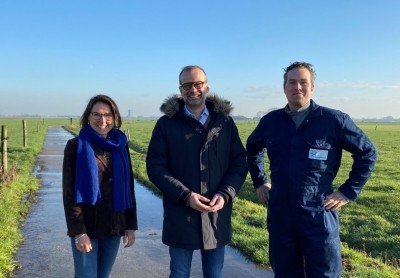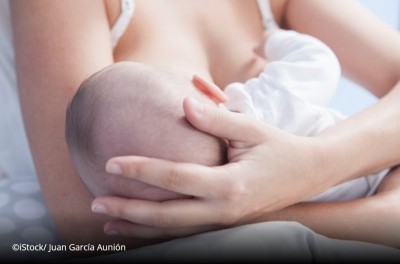Nutripedia app fights fake news about pregnancy and early life nutrition

Supported by the Danone Institute Foundation, the Nutripedia website and Chatbot app were trialled in Italy between June 2018 and November 2020 as a means of spreading evidence-based content about nutrition during pregnancy and the first 1000 days of life.
“The use of digital apps in health promotion intervention is emerging and could serve as a supportive strategy, with greater population reach, to provide scientific information and to fight fake news,” wrote the authors of a peer-reviewed paper on the Nutripedia project, in the journal Nutrients.
Early developmental programming
Early nutrition and lifestyle before and during pregnancy, breastfeeding and infancy can affect the risk of developing diseases such as obesity and metabolic syndrome during adulthood. Evidence strongly suggests that parents and families need to be supported with information about pregnancy and infancy for children to achieve their development potential. However, given the large amount of inaccurate information on the internet, people can easily become misinformed. Findings suggest that approximately 60% of pregnancy-related nutrition web pages contain inaccurate information.
In this context, the Nutripedia platform was rolled out to spread reliable content to counteract nutritional fake news and promote early nutrition. The first ‘collaborative’ and constantly evolving encyclopaedia about maternal and child nutrition, Nutripedia – InformaTI per crescere was developed by a multi-disciplinary team, including a panel of infant nutrition experts from RIMMI (Rete Internazionale Milano Materno-Infantile).
Eight blogging parents were engaged to spread the campaign, detect fake news (that was then corrected by the panel of experts), and publish posts about their own experiences of early years nutrition and about fake content. Their activities were overseen by the scientific board.
Early nutrition encyclopaedia
The platform consisted of a website, a social media page hosted on Facebook and Chatbot - a personalised advice app. The website was populated with three main types of content: scientific articles delivered by RIMMI experts, fake news debunking and parent blogs.
40 articles were published on the website, with more than 220,000 views. The most consulted were those focused on breastfeeding and weaning topics, for instance: ‘Example of weekly menu from weaning to first years’ (6987 views), and ‘Breastfeeding advice’ (4571 views). The main fake news interactions related to pregnancy and early nutrition. Examples include ‘Avoid carbs to weight up in the last trimester of pregnancy’ (2124 views) and ‘Homemade food and fresh vegetables are safer’ (1745 views).
Blogging-parents wrote 23 guest posts, generating over 135,000 views. On social media, over nine million users were reached via the bloggers’ activation, and more than 275,000 interactions resulted from the Nutripedia Facebook page.
Anecdotal feedback from users was revealed through comments on social channels and blogs.
“Users positively commented on the helpfulness of the website for increasing nutritional knowledge and awareness,” wrote the authors. In addition, they reported that parents commented on it being “quick and easy” to find information and were enthusiastic about the presence of experts.
Chatbot: personalised Q&A
The Chatbot was an interactive app that allowed parents to ask questions. A tag system linked questions to appropriate content and automated responses, and for topics not available on the app, users were connected with experts, and the information provided was then incorporated into the database.
The app was downloaded by 14,698 users. A total of 1930 questions were directed to experts and over 24,000 responses were provided by the app, 21% of which were recognised by the tag system. 1100 responses were uploaded by experts, on topics such as the timing of food introduction in early childhood, foods to be preferred or avoided during pregnancy and breastfeeding, and milk quantities during the first six months of life.
This engagement earned the ‘Nutripedia – InformaTI per crescere’ project endorsement from the Italian Association of Pediatrics (SIP) and the Italian Health Ministry.
Proof of concept study
As this was a pilot study for a newly developed app, no follow up data or formal user feedback was collected. However, the authors said this first experience represents a “first step to understand the potential effectiveness of the Nutripedia educational campaign”.
“Without replacing the clinical interaction between parents and paediatricians, Nutripedia could be a supportive tool for healthcare professionals by providing nutritional advice and real-time support for parents.
“As these new tools are inexpensive yet could generate a high value in terms of non-communicable disease prevention and cost reduction, policy makers should embrace these instruments to provide appropriate evidence-based scientific information to the general population, encouraging healthy lifestyle changes and dietary patterns,” they concluded.
Source: Nutrients
Verduci,E.; Vizzuso,S.; Frassinetti, A.; Mariotti, L.; Del Torto, A.; Fiore, G.; Marconi, A.; Zuccotti, G.V.
“Nutripedia: The fight against the fake news in nutrition during pregnancy and early life”
https://doi.org/ 10.3390/nu13092998







